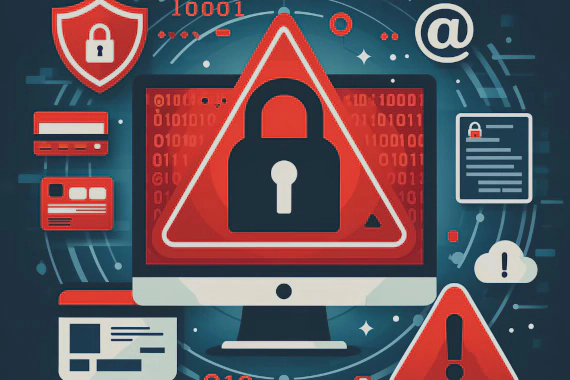
Data Breach Statistics: Breaches, ATO, Ransomware & Fraud
Top data breach statistics 30% of attacks exploited valid accounts to gain initial access, this represents the most …

It’s unfortunate but true: Small businesses are often a prime target for cybercriminals, mainly due to their lack of resources and focus on security.
Similarly, a lack of proper training and lax security measures makes it easy for cybercriminals to access data belonging to small businesses.
Unfortunately, the consequences of a data breach can be catastrophic for a small business, leading to financial losses, reputational damage, and loss of customer trust.
In fact, the damage often leads to the business’s demise. According to recent studies, as many as 60% of small businesses go out of business within six months of a data breach.
Yes, you read it right—sixty percent.
If you’re a small business owner, you should understand not only the risks but also the full scope of the consequences of having a more lax attitude when it comes to cybersecurity.
In this article, I’ll show you exactly that. We’ll discuss how data breaches affect small businesses in the short and long term and what you can do immediately to safeguard your data.
Before we get to that, though, let’s see how those breaches often happen in the first place.
FACT: There are countless ways for hackers and cybercriminals to gain access to a company’s systems. We go into more depth with examples in this guide.
But not all of those types of data breaches might be relevant to you. For one, your business might not have a large, multi-server infrastructure for hackers to break into.
That said, there are several methods that hackers are practically guaranteed to try when trying to access your data.
This is a form of malware that aims to deny access to a victim’s computer system or data until a ransom is paid. It usually starts with tricking an employee to download software that allows hackers to gain access to the company’s files. The hackers then encrypt the victim’s files to make them inaccessible and then requesting payment in return for the decryption key.
Unfortunately, ransomware attacks often have a second step - In many cases, refusal to make the payment often results in threats to release the data to the public. This is called double-extortion ransomware.
Phishing is a type of social engineering attack that uses seemingly genuine email or SMS messages (smishing) to trick recipients into performing an action.
But unlike a malware attack, which aims to have the person click on a link to download malicious software, phishing attacks aim to trick the victim into divulging sensitive information, such as passwords or financial details.
Cybercriminals often impersonate a trustworthy entity and provide a genuine reason why the person should take action on the message.
Keylogging, or keystroke recording, is an attack technique where cybercriminals use software or hardware devices to record the keys struck on a keyboard without the user’s knowledge.
By recording keystrokes, cybercriminals can quickly gain access to data such as passwords, credit card numbers, and more.
This can happen through physical methods, like taking a laptop or mobile phone, or digital techniques, such as breaking into a network to obtain sensitive files. The stolen data is often subsequently sold, used for fraud, or otherwise exploited to gain a competitive edge.
Unfortunately, not all data breaches start with malicious activity. Sometimes, a simple human error - sending an email to the wrong person or leaving a device behind on a subway - can result in sensitive data being accessed by a third party.
While most people are aware of the general harm that data breaches can cause to businesses, the short-term and immediate effects are often overlooked.
The immediate consequences of a data breach can be just as devastating to an organization’s finances.
Here are the top three short-term effects of a small business data breach:
Direct Fines and Fees: Direct fines and fees refer to the monetary penalties and charges that a small business may face as a result of a data breach. These can include fines imposed by regulatory bodies, legal fees, compensation paid to affected customers, and costs associated with investigations and audits.
Forensic Investigations: When a data breach occurs, businesses need to conduct a forensic investigation to identify the root cause of the breach. While these investigations can provide valuable information that can help patch the vulnerability used to gain access as well as prevent similar incidents in the future, they can also result in significant costs in the short term.
Costs Related to Enhancing Future Security Measures: In the aftermath of a data breach, businesses may be responsible for expenses associated with providing credit monitoring services to customers whose personal data was compromised. These efforts may also include costs related to replacing compromised cards, mitigating identity theft, and meeting compliance requirements set by the Payment Card Industry.
Small businesses often face long-term consequences that go beyond the immediate financial costs when they experience a data breach.
These consequences can impact the business’s reputation, customer trust, and overall operations, leading to potentially negative outcomes.
Five of the potential long-term consequences of small business data breaches include:
Damage to Brand Reputation and Loss of Customer Trust: A data breach can hurt your business’s reputation and lead to a loss of customer trust, which can have a significant impact on the bottom line. It’s important to understand that a data breach is not just a financial issue but it can have far-reaching implications that can affect your business’s success in the long term.
Loss of Business and Revenue: Customers may choose to take their business elsewhere after a data breach, leading to a loss of revenue that can be difficult to recover.
Legal and Regulatory Penalties: Small businesses may face fines and legal liabilities for data breaches, which can be costly and time-consuming.
Increased Scrutiny From Customers and Partners: After a data breach, small businesses may face increased scrutiny from customers, partners, and investors regarding their data security practices. This can make it harder to secure new business and attract investments.
Potential for Negative Media Attention: A data breach can attract negative media attention, which can further damage a business’s reputation. This can make it even more difficult for the business to attract new customers and may impact its ability to retain existing customers.
As a small business owner, keeping your sensitive information secure is crucial for the success of your business.
You can protect your business from potential financial and reputational damage by taking proactive measures to prevent data breaches.
Here are five best practices to consider:
Small businesses face serious cybersecurity threats from sophisticated and organized criminals, which means that having a data breach response plan in place to counter those threats is crucial.
While a cybersecurity plan doesn’t need to be overly complex or expensive, it does need to be tailored to your business’s unique needs.
Consider working with an external cybersecurity expert to help you develop a data breach response plan that covers both the big picture and the essential details.
RECOMMENDED READING: How to Mitigate the Risk of a Data Breach
When it comes to securing your business’s digital assets, there are several important software solutions that you’ll want to have in place.
These include firewalls, antivirus software, data breach monitoring, and endpoint detection and response solutions.
To stay protected from the latest security vulnerabilities, it is crucial to ensure that all software you’re using is up-to-date.
Software providers release updates regularly, with fixes and enhancements that help improve security. Failing to install these updates could make your systems vulnerable to attack.
The human factor can be a significant risk in terms of cybersecurity.
Employees may unintentionally put your network at risk by falling for phishing scams, using weak passwords, or connecting to unsecured networks.
To help prevent data breaches, it’s essential to provide ongoing security training to all employees to help them detect potential security threats.
Implementing strong authentication is an effective way to prevent data breaches.
Authentication should involve using more than one form of identity verification to access a system, such as a strong password and a security token.
Multi-factor authentication (MFA), which involves using multiple forms of verification, and biometric authentication, which involves using physical traits like fingerprints or facial recognition, are two popular authentication methods that can help protect against leaked passwords (but not leaked session tokens).
Data breach insurance can also help mitigate some of the damage of a data breach. Having a policy in place can provide financial protection and the resources to manage the aftermath of an incident.
Safeguarding your company’s sensitive data should be a top priority. Cyber threats are increasing, and avoiding potential data breaches is essential.
With Breachsense’s dark web monitoring, real-time alerts, and seamless integration, you can be proactive in protecting your organization’s data from cybercriminals.
Don’t leave your company’s security to chance.

Top data breach statistics 30% of attacks exploited valid accounts to gain initial access, this represents the most …

What is Data Leak Detection Software? Data Leak Detection Software is a specialized security solution that helps …